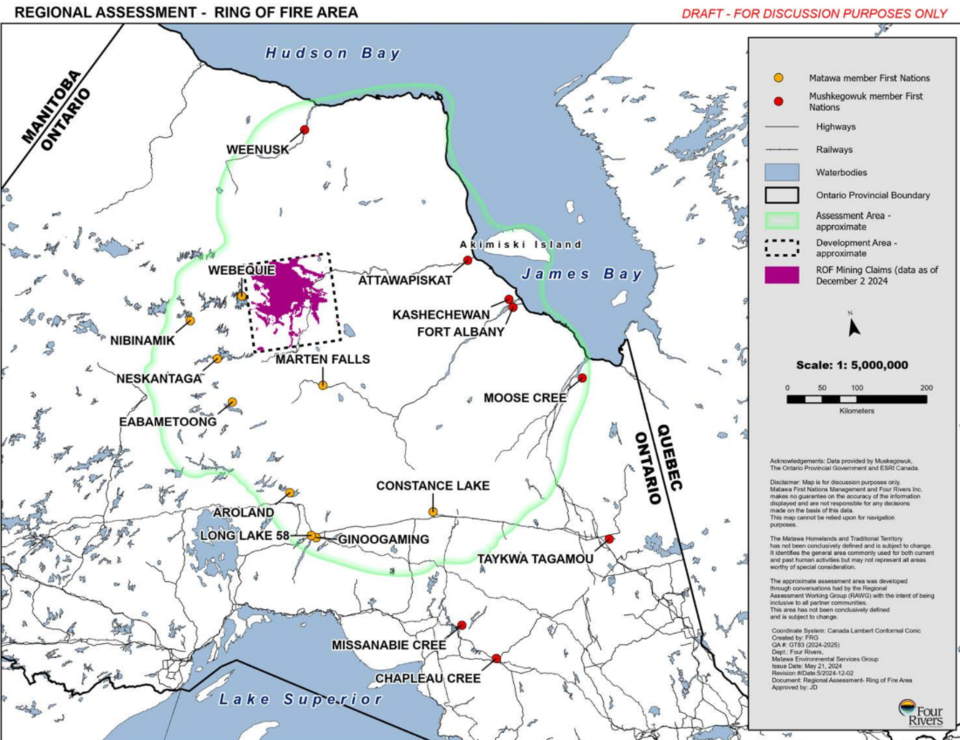Impact Assessment Agency calls on experts to support the work of Ring of Fire regional assessment


The Impact Assessment Agency of Canada (IAAC) and its 15 First Nation partners have invited expressions of interest from individuals and organizations that hold knowledge, expertise, information, or datasets that could support the work of the regional assessment. The parties have given interested parties until April 17, 2025, to submit their expression of interest.
The IAAC’s website has said: “The regional assessment will be conducted in the area centred on the Ring of Fire mineral deposits in northern Ontario, approximately 540 km northeast of Thunder Bay. The regional assessment aims to gather information and data on the region; understand potential effects from past, existing and future development in the Ring of Fire area; and will inform and improve future impact assessments. Indigenous partners and the Impact Assessment Agency of Canada are co-leading the regional assessment and will provide Indigenous communities and organizations, federal and provincial governments, non-government organizations and the public opportunities to meaningfully participate.”
The invitation is part of the on-going conduct phase for the regional assessment of the Ring of Fire area. In addition to information that is currently in the public domain, the IAAC and its First Nation partners recognized that there may be a variety of existing information and datasets held by individuals and groups that may be relevant to the regional assessment.
The IAAC and its First Nation partners aim to identify potential experts and information sources. They will then give this information to the working group conducting the regional assessment. Expert supports will work closely with the working group on the priority topics and activities identified by individual First Nation Partners and IAAC. These priority topics are included in section 6 of the calls for interest.
The IAAC and First Nations have said that to indicate what type of data or information is available, applicants are asked to fill out an expression of interest submission form, which is available on the regional assessment homepage on the Canadian Impact Assessment Registry under Key Documents (reference number 80468).
For questions, or to request a submission form, interested parties are asked to contact the IAAC's regional assessment team at regionalrof-cdfregionale@iaac-aeic.gc.ca.
The working group will review and evaluate the applications received to establish a roster of expert supports. The expert supports chosen by the working group will work closely together with the First Nations Partners and IAAC throughout the conduct phase of the regional assessment.
However, the process may take a long time and the ultimate fate of the body conducting the assessment is in the air given the election.
According to a media report from Northern Ontario Business, with the terms of reference now established, the working group has two months to develop a work plan — operating procedures, its timelines, meeting schedules and engagement opportunities — and, within 12 months, digitally post all the information gathered to date.
The working group will prepare a report that will go out within 30 months to the participating chiefs and the federal environment minister. The document will lay out potential positive and negative effects of current and future development activities. The report will include recommendations.
Once the report is in the hands of the government and First Nations, they will collaborate to determine how to respond to the findings and recommendations.
IAAC said back in 2020 the findings will be used to only inform a federal environmental assessment of any future mining projects, whenever that formal process begins.
Some political analysts have speculated over the fate of the regional assessment process if a new government overhauls the IAAC process. The federal Conservatives, in particular, have been critical of the IAAC.
Comments